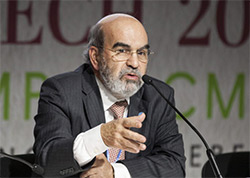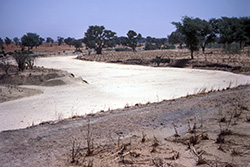Only joint action can bring success

FAO and its partners responded to the increasingly urgent issues of water scarcity by launching the Global Framework on Water Scarcity in Agriculture during COP22 of the United Nations Framework Convention on Climate Change (UNFCCC) in Marrakesh, Morocco in November 2016. The Global Framework seeks to catalyze international cooperation on water scarcity in agriculture in the context of climate change and growing competition for water resources.
At the 9th Berlin Agriculture Ministers’ Conference on 21 January 2017, during the Global Forum for Food and Agriculture (GFFA), 83 Ministers of Agriculture endorsed the Global Framework. At the World Irrigation Forum in Thailand in November 2016, the final declaration “noted with appreciation” the efforts to bring sustainable agriculture and food systems to the forefront of the global Climate Change Agenda based on the concept of the Global Framework.
The Global Framework’s scope includes the following areas of work:
- Coordinate among partners to make effective use of available resources and expertise on addressing water scarcity in the agriculture sectors
- Promoting the use of tested and effective tools and approaches with and among partners (including training and study tours)
- Building partnerships in focal countries to make effective use of available resources and expertise; to encourage domestic and donor funding in support of SDG 6.4 and the NDCs (including joint project formulation); and to foster national and local leadership and capacities.
- Supporting countries in prioritizing and formulating transformational projects to tackle water scarcity in agriculture (for example by organizing regional and national-level consultations).
- Strengthen national government-led planning processes and assist stakeholders to guide the development and implementation of sustainable agricultural water management and governance (including on-going and new projects by FAO and partners)
- Assisting countries in the preparation and formulation of plans and strategies pertaining to water scarcity, including agricultural water management plans; drought risk management plans; plans for the prevention and control water pollution by agriculture.
- Support countries in carrying water accounting and water auditing.
- Support the establishment of reference centres for irrigation modernization.
- Increase awareness and political prioritization of water scarcity to accelerate progress towards the achievement of the relevant SDGs and NDCs:
- Joint events at international conferences or high-level political meetings (e.g. UNFCCC COPs, UNCCD COPs, GFFA, World Irrigation Forum, World Water Forum, World Water Week and World Energy Forum).
- Series of political dialogue at international, interregional and national level on water scarcity-related topics and potentially, development of policy briefs (e.g. on establishing SDG 6.4 monitoring system; on systematic reporting/ database for water productivity; on guidelines for climate adaptation of small-scale irrigation systems; international workshop on “water neutrality”).

